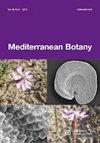Morphology of the invasive 'Carpobrotus' (Aizoaceae) in Europe: Malta as a case study
IF 0.7
4区 生物学
Q3 PLANT SCIENCES
引用次数: 3
Abstract
Since the late 19th century, different taxonomic views have been reported for Carpobrotus species occurring in the Maltese Islands, where the latest treatments imply two varieties of C. edulis and the doubtful occurrence of C. acinaciformis. Taxonomic inconsistencies are possibly derived from the poor understanding or misinterpretation of morphological characters. Moreover, the hybridogenous morphotypes resulting from horticultural advances make the determination of Carpobrotus even harder, especially with the application of outdated identification keys which do not take hybrids into account. The difficulty in determining Carpobrotus spp. has been expressed in several recent accounts within the Mediterranean region. A taxonomic investigation was carried out by applying eleven morphological characters adopted from recent monographs on 25 populations present in Malta. Three taxonomic units have been retrieved from the analyzed sample, where C. acinaciformis s.l. has been confirmed to represent all the purple-flowering populations and C. edulis s.s. for the yellow-flowering ones. Emphasis was given on the interpretation and understanding of distinctive morphological characters by employing a standardized method of assessment aided by images. This comparative morphological study resulted in a new characteristic in the leaves of C. edulis, by which it could be easily distinguished from C. acinaciformis in the vegetative state. A detailed discussion about the two different morphotypes of C. acinaciformis s.l. and dichotomous keys to distinguish Carpobrotus taxa are also provided.欧洲入侵性“Carobrotus”(Aizoceae)的形态学:以马耳他为例
自19世纪末以来,关于发生在马耳他群岛的Carobrotus物种,已有不同的分类学观点报道,在那里,最新的处理意味着两个变种的C.edulis和可疑的C.acinaciformis的出现。分类学上的不一致可能源于对形态学特征的理解或误解。此外,园艺进步产生的杂交形态类型使Carobrotus的确定更加困难,尤其是在使用过时的识别密钥时,这些密钥没有将杂交种考虑在内。地中海地区最近的几篇报道表明,难以确定Carobrotus spp。应用最近出版的专著中的11个形态特征对马耳他的25个种群进行了分类学调查。从分析的样本中检索到三个分类单元,其中腺泡状C.aciformis s.l.已被证实代表所有紫色开花种群,而C.edulis s.s.代表黄色开花种群。重点是通过使用图像辅助的标准化评估方法来解释和理解独特的形态特征。这项比较形态学研究在C.edulis的叶片中发现了一个新的特征,通过该特征可以很容易地将其与营养状态下的腺泡状C.eduliss区分开来。文中还详细讨论了腺泡C.aciformis s.l.的两种不同形态类型以及区分Carobrotus分类群的二分键。
本文章由计算机程序翻译,如有差异,请以英文原文为准。
求助全文
约1分钟内获得全文
求助全文
来源期刊

Mediterranean Botany
Agricultural and Biological Sciences-Plant Science
CiteScore
2.40
自引率
10.00%
发文量
30
审稿时长
12 weeks
期刊介绍:
Mediterranean Botany (ISSNe 2603-9109), formerly Lazaroa, is a biannual journal that publishes original research studies in the field of Botany including plant systematics, vegetation ecology, biogeography, evolutionary biology, ecophysiology, community ecology, ethnobotany and conservation biology on Mediterranean biomes but also in interacting areas.
Mediterranean Botany is an OPEN ACCESS Journal, free of charges for any published article.
 求助内容:
求助内容: 应助结果提醒方式:
应助结果提醒方式:


